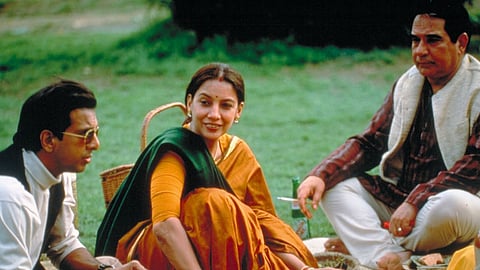
- HOMEGROWN WORLD
- #HGCREATORS
- #HGEXPLORE
- #HGVOICES
- #HGSHOP
- CAREERS
- ABOUT US
- CONTACT US

Deepa Mehta is an Indo-Canadian filmmaker who was born in Punjab in 1950 and moved to New Delhi with her parents when she was still a child. She was born into a family that shared a history in the film industry as her father was a film distributor. "I grew up with cinema, with Friday-night openings and Monday-morning grosses," she told the Philadelphia Inquirer. With roots in cinema and a burning passion for storytelling, Deepa, over a span of two decades, rose to become one of the most influential filmmakers from India.
Her most popular and critically acclaimed work is her Elements Trilogy with 3 movies written and shot through a feminist lens capturing the stories of a contemporary India and the social injustices of the time, especially against women — Fire (1996), Earth (1999) and Water (2005). Navigating the themes of homosexuality, the India-Pakistan partition and social treatment of widows, Deepa built a body of work dissecting the various dimensions of inequality through the female gaze.
For all the transformative work that she did, Deepa didn't really get any applause for it; in fact, it was quite the opposite. Fire was a tender film about a queer relationship starring famous Indian actresses, Shabana Azmi and Nandita Das that released in India and saw a major backlash when the homophobic, Right-wing Hindu group 'Shiv Sena' vandalised theatres in Mumbai & Delhi.
Earth portrayed the partition as co-related to gender relations. It acted as a counterhistory navigating the partition through women's experiences; exploring how a political event influenced their personal realms; bringing India's inherent Hindutva ideologies to the light, and inciting anger and hatred from extremist religious communities.
The director yet again faced the ire of the Indian government and religious fundamentalists when she attempted to shoot Water, first in the holy city of Varanasi and then at other locations. For trying to expose the plight of Indian widows, who are forced to enter 'widow houses' and left to survive any way they can, Mehta received death threats, was burned in effigy in cities across the country and even had her set burned by a mob and thrown into the Ganga river. Though it took roughly five years to finish the project, she was able to complete the film in Sri Lanka, under an assumed name.
Deepa faced a decade-long term of hatred from her own home country directed towards her art that she cared deeply about and that was crucial to start dialogues focused on creating a better future for women. She still kept making films that mattered, unflinching. The narrative of being a 'controversial director' suddenly changed when in 2007, Water was nominated for in the Best Foreign Language Film category for the Oscars.
Around 2012, Salman Rushdie and Deepa met in Toronto where she expressed her interest in making a film on his iconic book that in her words, "defined the post-colonial India". Salman would later sell the rights of his book, Midnight's Children to the producer, David Hamilton for $1. Speaking on Deepa's ability to juxtapose the political with the personal, Salman couldn't think of any other filmmaker that would do a better job directing the film.
Among Deepa's latest works, is a 2016 documentary-fiction film called Anatomy of Violence, focusing on the notorious gang rape and murder of 23-year-old Jyoti Singh on a bus in New Delhi back in 2012 in which Instead of dwelling on the crime itself, the director explores the lives of the rapists; ultimately asking what it was that led them to commit such a heinous crime.
In 2020, Deepa also shot a film that became Canada's official Oscar entry for that year called Funny Boy, a coming of age story of a gay Sinhala-Tamil affair set in Sri Lanka at the onset of the civil war in the 1970s. It is both a lavish period film and a moving story and is based on the best seller of the same name by Shyam Selvadurai.
Since she started making documentaries in the 70s, Deepa Mehta has worked against the odds to tell stories and subvert and rebuild narratives that are important despite the controversy and stigma that surround them. From warm love stories to gritty religious commentaries, Deepa, in her illustrious career has scaled a diverse range of themes and maintained a consistent feminist lens; creating a feminine and intimate framework of storytelling that has since evolved into a genre in itself, giving us films like Lady Bird and The Power of the Dog.
The filmmaker turns 73 this week. From the curious little girl who loved watching film reels load onto projectors in her father's movie hall, she has expanded into a full-blown phenomenon in the world of cinema weaving wholesome narratives dipped in the colours of gender, nationality, humanism and identity. Deepa Mehta is a true example of a pioneer who dove right into the most painful affairs of society and carved them into tales of women's grace and beauty.
